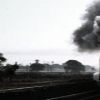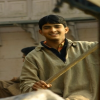
No matter how much you would bully him, Raju wasn't the kind of boy who would retort violently. He sported the awkwardness typical of him through his widening grin. The elders of the village admonished him, his peers poked fun at him and even his juniors jeered him as “Pagal” (Madman). But nothing made a difference to this good-for-nothing chap of this small village. His mother died at the time of his birth and the inauspicious child was being raised by his father since then. Dhula, his father, was a farmer whose life was bludgeoned under an ever increasing debt from the crooked money lender Dani. To make matters worse, he was alone to look after his child. At times, Dhula thought of remarrying so that the infant would get a mother and he could procure some money as dowry. But his inner-self resisted. He knew that stepmothers often turn out to be ugly for the child. So, early morning he would deliver the child to his sister Vimala’s house nearby and pick him back in the evening. Contrary to his expectations, the toddler was just a burden to Vimala and she took least care of him. When the infant cried of hunger, she scornfully remarked, “God save us from this menace. The kid has got a demon’s appetite. Please stop crying. This hunger has devoured your mother.” The rebuke was incomprehensible to the minor and it wailed miserably most of the time. Vimala, almost in a sheer fit of rage, would often thrust a minimal and improperly cooked quantity of food to silence the grieving noise. She never breastfed the kid. Her own children were growing up gleefully, almost as a glowing contrast with the impoverished and mentally inept Raju. Dhula realised his sister's negligence but he himself was crumbling with abject poverty. The harvest has not been good for the past 3-4 years and the wicked Mahajan was threatening to seize his small land.
Raju was now four year old and went to the field with his father. His stature was pale and he was ill-formed to the extent that he would often fall down walking. Dhula carried the child in his arms most of the time. The kid could not speak properly but would watch his father tilling the field from dawn till sunset. He relished the food they had together. The scanty menu included chapattis or muri with sugar, yet Raju’s face glittered with smile when his father used to adoringly feed him. In the evening, Dhula amused him with half-baked mythological anecdotes, something which the former heard in his childhood from his garndmother. Raju would often fall ill and the local vaid (Doctor) stressed on the importance of proper diet. This only meant further piling of debt. Still Dhula’s love for his son ignored his financial distress.
Raju was responding to the medication and diet. Although he was still weak and mentally inept than the children of his age group, he could now manage to walk, talk, run and assist his father on the field. He was six now and the cultivation had turned favourable for Dhula that year. With the proceeds he bagged from the produce, he cleared off a bulk of the debt he owed to the wicked Dani who had the reputation of charging exorbitant interest.
One day in the field, Dhula was busy collecting the haystacks and Raju was chasing a tadpole. The chase continued almost till the ridge when a hooting sound caught the child’s attention. A white Ambassador car was passing by through the road adjacent to the field. Raju was aware of the buses. He has seen buses at the depot which leave for the town. People flocked in these carriages. Some seated, some remained standing, a few gathered on the roof and some used to dangle from the side. But never has he seen such a vehicle. It was all white almost like the chariots of the mythical stories. It had two partial openings. What were they? Doors or windows? One person was seated in front and one was relaxing behind. He saw two huge wheels, not like the slender ones in bullock carts but gigantic ones. There were probably more wheels; did it have 4 wheels like the bus? He was awestruck and couldn't even utter a sound.
He ran hurriedly to his father and explained the bizarre happening. Dhula smiled and said, “It's a car. People use it in cities and towns. Here in our village too, you can see cars in police station. Those are called jeep cars.” For the next few days, Raju pleaded day and night to take him to the police station. After much nagging, Dhula finally took him to the police station which was about twelve miles from where they stayed. The place, the khaki uniform clad policemen, the hustle and bustle of the market didn't make any impact on Raju. His gaze was fixated on the two jeeps stationed outside the chowki. He almost obsessively observed the cars. It was like living a dream. His father was explaining to him the nitty-gritties of the car – “See the round structure in front. With the help of that they move the car right or left.” Raju’s nascent mind was absorbing everything about the situation. On their way back home, the little child kept blabbering about the spectacle he had witnessed. He spilled out his aspirations of having a car of his own. Dhula caressed the child and said, “One day you will go to the city and have your own car.” Raju’s eyes gleamed with latent joy at the very thought of it. He often mimicked steering movements while emitting engine sounds – bhooh, bhooh, bhooh. The frolic ended in a thud. One morning Dani came with his two henchmen and the local Village head. Dhula was down with fever and was quietly resting inside the house. Raju was playing outside. The goons entered and dragged Dhula mercilessly outside. Raju couldn't figure out anything. He rushed to his father. The two goons were striking blows and the child was trying to cover his father fruitlessly. After the beating ceased, the Panchayat was called and it was decided that Dhula was guilty of default. He had taken a loan of Rs 40,000 and hasn't repaid Dani within the stipulated period of six months. Dhula wept and pleaded incessantly that he had repaid the loan he took. But Dani showed the crowd the agreement where Dhula’s thumb impression was prominent. The pleas were disbelieved and the Panchayat gave its verdict. Dhula has to pay Rs 50,000 to Dani within a month failing which the latter would take away his farmland. Dhula and Raju sat helplessly at the precincts; hours after the judicial proceedings were over. The child tried to comfort his anxious father but with little avail. That night both of them couldn't sleep a bit. In the morning, Raju slept and woke up to find Dhula still in bed. He tried to wake him up but his father didn't move. The little boy again tried to wake him up desperately but couldn't. The local vaid came and officially confirmed that from that date Raju has been orphaned. What followed was an extreme state of destitution and deterioration of the child’s mental and physical health. He lost his father's farmland to Dani. He was evicted from his house by Vimala who was now the proud owner of two houses in the village. He took up menial jobs for survival; sweeper in local rice mill, loader in a local cold-store, servant’s work in a Brahmin household, but couldn't sustain anywhere for long. His physical and intellectual disabilities were major hindrances in his work. He missed his father all the more. The local priest Shantaram took a pity on him and employed him in Temple duties. There too he proved to be incapable but the priest's benevolence ensured Raju a square meal.
Despite being laden with misery, Raju was gregarious and loved to talk with whosoever he came across. His incongruous talk invited derision but he managed to pour his heart out. The bottom line of most of his statements was his aspiration to go to the city, earn money and to have his own car. He has heard from Shantaram that it is only the body that dies, not the soul. The body sleeps, the soul flies. These words provided solace to his lonely heart. His father's soul had not deserted him. The day when he would realise his dream, his father’s soul will be very happy.
It has been almost sixteen years since Dhula died. Today was a special day in Raju’s life. There has been an announcement from the Panchayat yesterday. The State Security Forces would select only one from the Tehsil for the post of line staff. They would conduct a physical test at the high school ground. Even the immature Raju understood this opportunity can turn the wheels of fortune. Shantaram gave him a brand new shirt and trouser for the event. In the entire village, he was the only one to wish him well.
Raju arrived at the scheduled time. For the first time in his life he was properly dressed and mentally geared up for an occasion. Near about fifty heads had gathered. Most of them were well built and more adept. But Raju was adamant. He has to make it count. The candidates were made to stand in a line. Three officers were seated under the banyan tree with a table and sheets of paper in front of them. A constable was calling the names. Raju got his call, something which wrung his nerve. The boys were made to participate in a race, more appropriately a marathon walk covering a distance of thirty-five kilometres, starting from the Banyan point up to the last hill at the end of the forest. It was a May afternoon and the temperature was around forty-five degree Celsius. The sun was scorching and one could feel the heat waves passing through. The birds seemed to have stopped chirping. It was an arduous task but Raju was undaunted. He has always been a nobody. He was determined to make this one count. The race began amidst the terrible atmosphere. This heat was taking a toll on everyone. After half an hour one runner fell down. His eyes were half closed and the poor soul was gasping for breath. Raju became terrified but still he kept on walking. He was feeling beastly uncomfortable. His limbs were aching, he felt nauseated yet he persisted. One by one the contestants were eliminated. Some were vomiting in corners of the forest, some were simply knocked unconscious. The race anyway progressed. The officers who were patrolling the running pack were oblivious to the ones who were getting singled out. This is all about the Survival of the Fittest. Who cares for the weak?
Two hours passed and the group was reduced to nine. Raju could barely walk anymore. His vision was getting blurred, his steps were turning clumsy and he felt like quitting. But every time he closed his eyes, the sight of that white ambassador appeared. His desire kept him going. Few others gave up and now the fight was between three of them. All three of them were stretching their limits to the extreme. The guy on Raju’s right tried to accelerate but fell down face first. Now the fight was between the final duo. Raju and Kendu trader Kale’s son, Bipra. The touchline was about half a kilometre away. Both started sprinting. Bipra being taller and stout went ahead but Raju’s tenacity brought an agile force in him. It was the last hurdle. He had to make it count. They were near the touchline with Bipra darting at full speed. Raju was employing all his might and then all of a sudden Bipra tumbled. He was reeling with agonising pain. Raju stopped for a while feeling empathetic for Bipra but the goal was near. He had almost made it. At the last moment he made a dive and crossed the line. He was lying over the line unconscious. To everyone's amazement, the mad boy had made it.
For the first time, his achievement was revered. He was treated with respect. Most importantly, he got the first chance to ride a car. The patrolling car took Raju from the field where he emerged victorious to the Temple where he worked. Onlookers watched him with utmost curiosity and shock.
The only face which displayed remorse was that of Shantaram who was waiting to perform his cremation rites.
About the Author







Comments